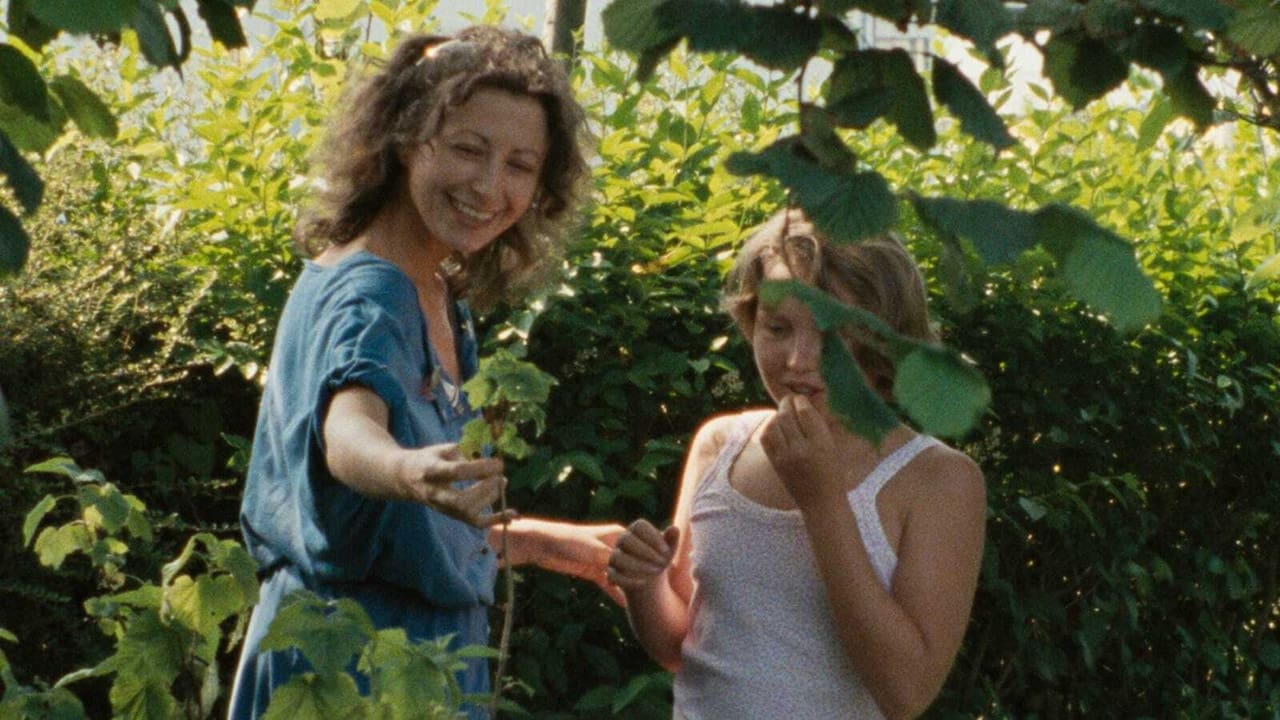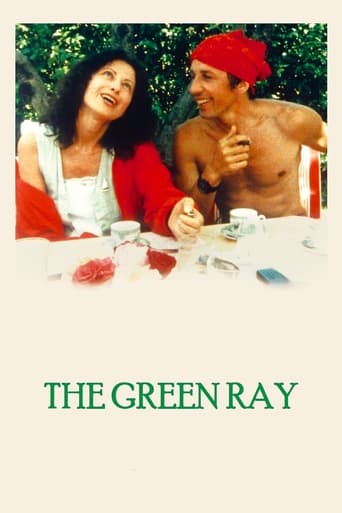

The green ray in the title of this French movie (also called green flash) refers to an optical phenomenon in which you can sometimes see, under certain hard to attain conditions, a green light coming from the horizon right after sunset (or right before sunrise). The famous French novelist Jules Verne wrote about this natural occurrence in a book called "The Green Ray" which is briefly referred to in the movie.The film itself is about Delphine (played by Marie Riviere, who has been in several movies of director Eric Rohmer), who works as a secretary in a Paris office. She is a slender, tallish, moderately attractive black haired woman in perhaps her late twenties and has a "difficult" personality. She has recently broken up with her boyfriend, right before the summer holidays, and the prospect of lonely vacations much saddens her (though to some in the audience it might not make the most compelling of tragic situations). So the movie is about her talking with friends about her predicament until she decides to go alone, meeting on the road a few people (including a Swedish woman who she first meets topless at a beach and who is meant to represent sexually liberal attitudes). I'm not going to spoil it for you whether Delphine will find a romantic partner or not during her travels, but the ray of the title does make an appearance.The movie is from 1986 and since it was shot on the street, you can see people with what are now "period" clothes. If you were, like me, a child in the 1980s, you will probably like this.Talky, as expected from the director, but the dialogues are not as pretentious as in other of his movies. Not the best of Rohmer, but very watchable. One problem with the plot is that it is not terribly original, since most of us have seen too many movies about single women around 30 years of age feeling lonely.
... View MoreIt is hard to believe that this amateurish film(single camera,long takes) about an impossible, narcissistic, Parisien woman with,as a previous reviewer has said ''mental problems''(I suspect this is a the modern take) won a prize at any film festival. I very nearly fast forwarded it at times,so tiresome was its arid,static nature. Rohmer's style is talking rather than action;the talking was an over- analysis of her fragile state of mind and the action was watching this precious self pitying woman(the veggie lecture was so typical)flounce out of every place and situation that her very indulgent friends and acquaintances kindly set up for her,or burst into tears when things weren't going well.Hiding the film behind spurious messages only made things worse. This film reminded me of those indulgent plays that the BBC made in the 70s where little or nothing happened,the play was then forgotten never to be seen again.When this film was released Rohmer was revered by art film lovers but I can't help thinking he has been found out.An over-rated film from an over-rated director.My copy was given away by a newspaper.Terrible film.Good coaster though!
... View MoreAs a movie buff weaned on the Hollywood classics of the thirties and forties via endless reruns on TV I absorbed by osmosis the 'classic' style of film-making - Master Shot, Long Shot, Medium Shot, Close Shot, 2-Shot, Reverse Angle etc - without being able to put a name to them and this is perhaps why I find Rohmer 'amateur' in terms of Style. I have reached the conclusion that 1) he doesn't 'know' how to make fluid films, 2) he does know but has only contempt for this kind of 'professionalism' or 3) can't afford multiple set-ups for each scene and so settles for the 'boring' option.This particular movie - given away with a British newspaper - begins with a long shot in which two girls are talking in an office. A third girl enters the scene and has a telephone conversation. Rohmer shoots the WHOLE thing in what would be, in the Real film-making world, a Master Shot with a static camera. Time and time again we get something similar, not necessarily a Long Shot, sometimes he even gives us a Close Shot that lasts interminably. I'm guessing that his shooting ratio is one of the shortest of any director, about one-to-one, two-to-one at the outside. Filming like this means, of course, that you'd better have something really riveting to say or you're going to alienate anyone who has access to TV reruns and/or a video/DVD player. Arguably viewers born some ten or twenty years after Rohmer helped establish the short-live New Wavelet will accept these crude methods never having known Style but the rest of us are obliged to look at Content and all too often come up empty. This entry benefits from a fine central performance but that's about it.
... View MoreThe Green Ray is certainly a strange fish - quite simply it's about a single girl's (almost)wasted summer, going on holiday 3 times, and each time finding herself bored and frustrated, and ultimately an outsider. We see scene after scene of holiday makers having a good time, and poor Delphine just not feeling at ease. She is somewhat opinionated, for example in the vegetarian lecture - we've all had to sit through one of those, and liable to burst into self-pitying tears, but Delphine never the less gets my respect for her refusal to opt for second best.Very few directors would be brave enough to make a film like this, but Rohmer pulls it off magnificently, and in the process delivers one of his finest movies. I can see why some viewers might find it a waste of time, but having been on a couple of solo holidays in the past I can sympathise with Delphine's predicament. Plus The Green Ray rewards the patient with a truly poetic finale.
... View More